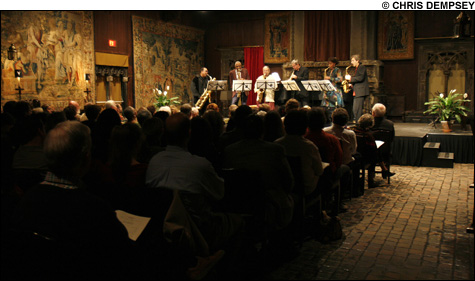
HARD BLUES The Hemphill concert rocked the Gardner’s Tapestry Room.
|
|
WFNX Jazz Brunch top 5 for the week of October 21
1. Dee Dee Bridgewater, Red Earth: A Malian Journey [Emarcy]
2. Herbie Hancock, River: The Joni Letters [Verve]
3. John Scofield, This Meets That [Emarcy]
4. Miles Davis, The Complete On the Corner Sessions [Sony Legacy]
5. Manu Katché Playground [ECM]
|
For much of his life, no one played Thelonious Monk pieces except Thelonious Monk. Even now, Monk isn’t as pervasive as you might think. So how does the music of a visionary composer like Julius Hemphill survive, if not become standard repertoire?
One answer was evident at the Gardner Museum a week ago Thursday night. Hemphill died in 1995, but his long-time companion, the esteemed pianist and new-music specialist Ursula Oppens, was on hand along with one of Hemphill’s frequent collaborators, Marty Ehrlich, as well as the Julius Hemphill Sextet and the Daedalus String Quartet. For a good two hours they had the Tapestry Room rocking for a sold-out audience that included veteran jazz fans as well as neophytes. It’s doubtful anyone left the hall who isn’t looking forward to hearing more Hemphill.
Hemphill was born in Forth Worth, a cousin of Ornette Coleman, and he exemplied the region’s raw, rootsy, blues-drenched sound. His alto playing had Bird-like fluidity, but — born in 1940 — he had a strong taste for doo-wop and R&B as well as Mingus-like structures full of twining contrapuntal lines and collective improv, and grounded in funk rhythms. His work gained its greatest prominence when he was one of the key players/composers for the World Saxophone Quartet — a “hit” avant-garde group of the ’80s that still carries on.
Through-composed pieces played by the Daedalus and Oppens bridged the two halves of the wisely devised program at the Gardner, with the Sextet — created by Hemphill and continued by original member Ehrlich — opening and closing the night. This was a hefty group: legendary players Andrew White and J.D. Parran along with Ehrlich and the younger Alex Harding, Andy Laster, and Matana Roberts.
The first number, “Fat Man,” was typical — a character portrait (written for Hemphill’s opera, Long Tongues) that stated a long-lined, winding theme with a rising dynamic before settling into a rocking ostinato from White’s tenor and Harding’s baritone. The theme split off into free-flowing counterlines, and back into supporting riffs for soprano and alto solos. “Opening,” written for the Bill T. Jones/Arnie Zane dance company, was a stately curtain raiser, with call-and-response figures and tart sustained, dissonant harmonies. “Mirrors” was a feature for Parran’s soprano — his a cappella passages varied beautifully calibrated vibrato and split tones with silky fast runs as the band answered him with chorus figures or gaggled like ducks. I had begun to think that those sustained melancholy ensemble dissonances were becoming too much of good thing, but then in “JiJi Tune” the high horns suddenly took off from the rocking bottom, soaring over the top with a jaunty beboppish theme that might have been some latter-day imagining of the Dizzy Gillespie Big Band.
“One Atmosphere” — for Oppens with the Quartet — offered those harmonies and lines with less rhythmic grounding. Piano and strings sparred, then a brief call-and-response pattern would emerge, a jazz chord, or a satisfying eight-beat figure in 4/4. The solo piano piece “Parchment” leaned even farther in the direction of serialism — more discontinuous, spiky rhythms and splashes of color, skittering lines and then chordal rests. A couple of times in the three-minute piece, an R&B bass figure emerged — a recurring memory.
“Mingus Gold,” an arrangement of Mingus themes for the Quartet, showed Hemphill’s strengths and weaknesses with the instrumentation — “Nostalgia in Times Square” had the appropriate humorous, slurring swagger in the phrasing but needed rhythm-section swing. “Alice’s Wonderland,” though, connected Hemphill and Mingus to ancient American folk — Africa seemed to disappear. “Better Get Hit in Your Soul” allowed Hemphill to write a Mingus bass solo for Clancy Newman’s pizzicato cello. Cool.
The closing “The Hard Blues” was one of the real rockers, Harding holding down the riff as the Sextet left the stage and marched around the room, then convened in front of the stage for ecstatic collective-improv blowing. Before the concert, Ehrlich had announced that Oppens was still finding Hemphill pieces that had not been recorded, or even performed. “Like most composers, he wasn’t interested in documentation, he was writing for tomorrow.” Good for us.
Aside from original pieces like Hemphill’s as a source for jazz players, the quest for modern standards continues — the pop tunes that will take us past the Great American Songbook of Cole Porter, Irving Berlin, the Gershwins, et al. Steps have been taken: Radiohead and Nick Drake are part of Brad Mehldau’s book, Jason Moran does Afrika Bambaataa, the Bad Plus do Nirvana, and lots of people, including most recently Herbie Hancock, have taken up Joni Mitchell. Pianist Cyrus Chestnut (who plays the massive Dimock Community Health Center “Steppin’ Out” gala benefit on November 3) is no stranger to what Don Byron has called “the weird cover” as the “great act of jazz.” A couple of years ago, he and the saxophonist James Carter were part of a band who took on — of all things — the Pavement songbook, at the bequest of the Brown Brothers label. Under the rubric of Gold Sounds, they put out a CD and even played Newport.